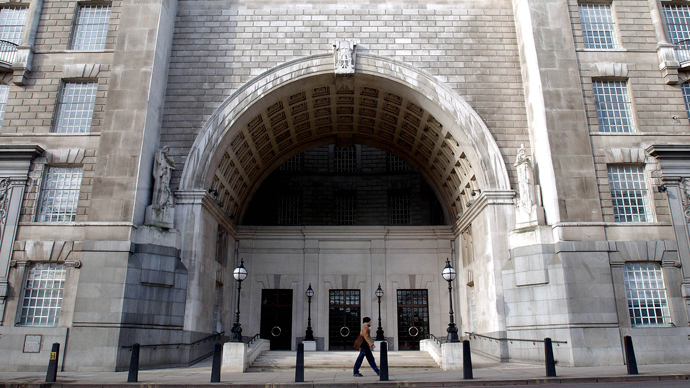‘MI5’s War on Terror rhetoric prepares future UK foreign interventions’

The “contradictory” war on terror rhetoric from MI5 security service head is first of all aimed at justifying UK’s future interventions into foreign states, anti-war activist Jim Brann told RT.
MI5 chief Andrew Parker has made his first public speech since
taking charge of the UK’s security service this April as he
shared his fears and concerns in an alarming address.
The security chief warned that the British public is under threat
of attacks from thousands of Islamists and confessed that the
country’s intelligence service hasn’t been perfect on all
occasions.
Anti-war activist Jim Brann believes that Parker’s comments will
make live harder for British Muslims, whom the government is
portraying as the main threat to society.
RT:What do you make of the statements by the MI5
chief? Why issue the warning now? If we look at the Terrorism Act
that’s already in place, this has never lost priority with this
government.
Jim Brann: No, and it’s most general, I think you have to say
that it’s all of a piece with the War on Terror, that’s to say
there are certain things that he said that have some logic and
there are certain things that he said that on the face of it have
no logic. And they’re all bundled together under this rubric of
the War on Terror.
RT:Which of the statements lacked logic?
JB: For example, he said that people, who go to… I mean,
clearly, there are people in the [UK], who go to Syria, and
there’s some possibility that they may cause some problem, coming
back here, because they’ll end up coming here. That has certain
logic. On the other hand this line – it’s quite contradictory in
his speech. He said that there are thousands of people in this
country, who would plot, are plotting or in some stage of
plotting. And on the other hand he said; “No, no.” He said that
since 2000 we’ve dealt with two serious plots per year. So,
presumably these thousands of people plotting are completely
unsuccessful.

RT:Right, that’s not coherent to you. Parker mentioned
the people fighting in Syria coming back, but what about the
British extremists, who may have been involved in attacks
elsewhere as we’ve heard about the speculation of their
involvement in the recent Kenyan shopping mall attack? What do
you make of that kind of threat?
JB: I think this “White Widow” story – British citizen
Samantha Lewthwaite has been labeled by the UK media as the
“world’s most wanted woman” for her involvement in terrorist
activity – I find it extremely dubious. They have to bolster this
idea of the War on Terror as a coherent thing where the threat is
coming from out there; the threat has nothing to do with what the
British government does; it comes from out there and it remains
out there. They have to present the thing that way and in that
context they have, for example, this “White Widow” supposedly in
Kenya.
RT:And what does the British government want to
justify by it?
JB: At its broadest, intervention everywhere. That’s the
point. That’s the starting point to the War on Terror that we are
justified in what we do because of the threat that already
exists. Rather than that we are creating the threat.
RT:In the context of British society, we’ve seen this
kind of fear of terrorists as it impacts British Muslims.
What impact will this have now?
JB: You speak to young Muslims and they’re extremely
disturbed with this constant presentation of them basically being
a threat. And if you say “there are thousands” then people should
really look around. They should look at people, look at mosques
and be worried. That’s the gist of it. And there’ll be…
especially, young Muslims will be worried, no doubt.
The statements, views and opinions expressed in this column are solely those of the author and do not necessarily represent those of RT.












